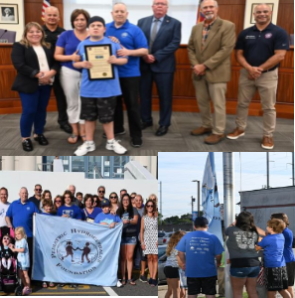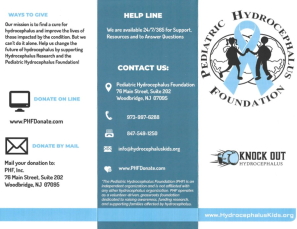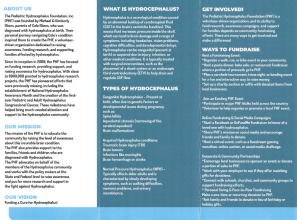Ind. woman educates others about hydrocephalus
January 27, 2013 by PHF
Filed under Uncategorized
Comments Off on Ind. woman educates others about hydrocephalus
 BLOOMINGTON, Ind. (AP) — When 25-year-old Megan Elmore was 20 weeks pregnant with her second child, she underwent a routine ultrasound in the office of her Bloomington obstetrician/gynecologist.
BLOOMINGTON, Ind. (AP) — When 25-year-old Megan Elmore was 20 weeks pregnant with her second child, she underwent a routine ultrasound in the office of her Bloomington obstetrician/gynecologist.
“Her head measurement was way off,” said Elmore, a single mother from Gosport whose firstborn is a healthy 2-year-old son. “I was very concerned.”
Further testing at two Indianapolis hospitals revealed that her baby, Aila, had hydrocephalus — an incurable condition that causes excessive fluid to collect in the brain, abnormally enlarging the head and placing potentially fatal pressure on brain tissues. The disorder affects about 1 in every 500 births.
When Aila was born four months ago, her head circumference was 46 centimeters, about 11 centimeters larger than normal for a full-term newborn. At the Riley Hospital for Children at IU Health, doctors placed a shunt into her skull just above her temple to drain fluid from her brain into a tube that empties into her abdomen.
But the shunt does not drain all the excess fluid because Aila is missing most of her cerebral cortex, a sheet of neural tissue in the brain that plays a key role in memory, attention, perceptual awareness, thought, language and consciousness.
“If they drained all the fluid, her brain would collapse and she would probably die,” Elmore told The Herald-Times (http://bit.ly/XQB5wv ). “So the shunt is used to keep her fluid level stable and prevent the pressure on her brain from becoming dangerous. She will need the shunt for the rest of her life.”
Elmore said it’s too early to know the long-term effects of Aila’s condition, which can cause such things as learning disabilities, memory problems, motor skill disabilities, seizures and hearing or vision problems.
“The doctors can’t say whether she will be able to walk or talk,” she said. “But so far, she is eating and breathing on her own. My hope is that she will be able to have a life as full and productive as humanly possible.”
During her pregnancy with Aila and after her daughter’s birth, Elmore received a wealth of support from not only from her mother and other family members, but also from the Pediatric Hydrocephalus Foundation, a nonprofit organization with 30 state chapters that funds research and provides support to families, friends and children affected by the disorder.
“The foundation helped me know what questions to ask the doctors,” Elmore said. “There are times when I got overwhelmed, and the people at the foundation calmed me down and explained things to me or told me where I could find the information I wanted.”
So when Elmore learned the director of the Pediatric Hydrocephalus Foundation’s Indiana chapter had stepped down, she volunteered to fill the position.
“I didn’t want any family to face hydrocephalus alone,” said Elmore, who answers to a board of directors. “I wanted to make sure the state chapter would be there so they could get the same kind of help and support that I received.”
Since assuming the directorship in November, Elmore has placed educational pamphlets about hydrocephalus in pediatricians’ offices, made efforts to form family support groups, and put information about the state organization on Facebook.
“I also hope to have two local fundraisers within the next year that will include all the kids and their families,” she said.
Elmore was recently delighted to learn that the national Pediatric Hydrocephalus Foundation has selected Aila and a young boy to be the 2013 faces of the organization. The two infants, along with their stories, will be printed in pamphlets that will be mailed to U.S. congressional representatives and used in other educational outreach efforts.
“The foundation is hoping their story will inspire families to realize that just because your child has hydrocephalus, it doesn’t mean your child’s life is over,” she said.
The Pediatric Hydrocephalus Foundation raises awareness about the disorder and raises money for research on treatment options and, hopefully, a cure. The foundation also advocates on behalf of members by asking state and federal legislators to push for more research and support in the fight against hydrocephalus.
Since 2010, the foundation has awarded $125,000 in grants and donations to hospitals, neuroscience institutes and medical research centers for research and education.
 Read more at: https://html.com/attributes/img-width/>
Read more at: https://html.com/attributes/img-width/>


























